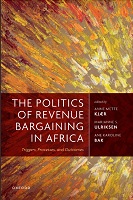The Politics of Revenue Bargaining in Africa
Triggers, Processes, and Outcomes
Contributor(s)
Kjær, Anne Mette (editor)
Sandvad Ulriksen, Marianne (editor)
Bak, Ane Karoline (editor)
Language
EnglishAbstract
This book examines the politics of revenue bargaining in Africa in a time when attention to domestic revenue mobilisation has expanded immensely. Measures to increase taxes and other revenues can -but do not always- lead to a process of bargaining, where revenue providers negotiate for some kind of a return. This book offers in-depth analyses of micro-instances of revenue bargaining across five African countries: Mozambique, Senegal, Tanzania, Togo, and Uganda. All case studies draw on a common theoretical framework combining the fiscal contract theory with the political settlement approach, which enables a systematic exploration into what triggers revenue bargaining; how these processes unfold; and finally, if and when they reach an agreement (whether a fiscal contract or not). From the empirically rich case narratives emerges a story of how power and initial bargaining position influence not only whether bargaining emerges in the first place, but also the processes and their outcomes. Less resourceful taxpayers are in a more difficult position to raise their voice, but in some cases even these groups manage to ally with other civil society groups to protest against tax reforms they perceive as unfair. Indirect taxes such as VAT often trigger protests, and so do sudden changes in tax practices. Revenue providers rarely call for improved services in return for paying tax, which would be expected to nurture the foundation for a fiscal social contract. Instead, revenue providers are more likely to negotiate for tax reductions, implying that governments’ effort to increase revenue is impeded. We do find many instances of state-society reciprocity when ruling elites try to be responsive to revenue providers’ demands. Hence, this book gives insight into the nature and dynamics not only of revenue bargaining but of policy-making in general as well as the implications hereof for state-society reciprocity in Africa.
Keywords
Revenue bargaining; fiscal contract; political settlement; Africa; taxation; state-society relations; political economy; domestic revenue mobilisation; reciprocity; comparative politicsDOI
10.1093/oso/9780192868787.001.0001ISBN
9780192868787Publisher
Oxford University PressPublisher website
https://global.oup.com/Publication date and place
Oxford, 2024Grantor
Classification
Development economics and emerging economies
Political economy
Comparative politics
Central / national / federal government policies
Africa


 Download
Download Web Shop
Web Shop